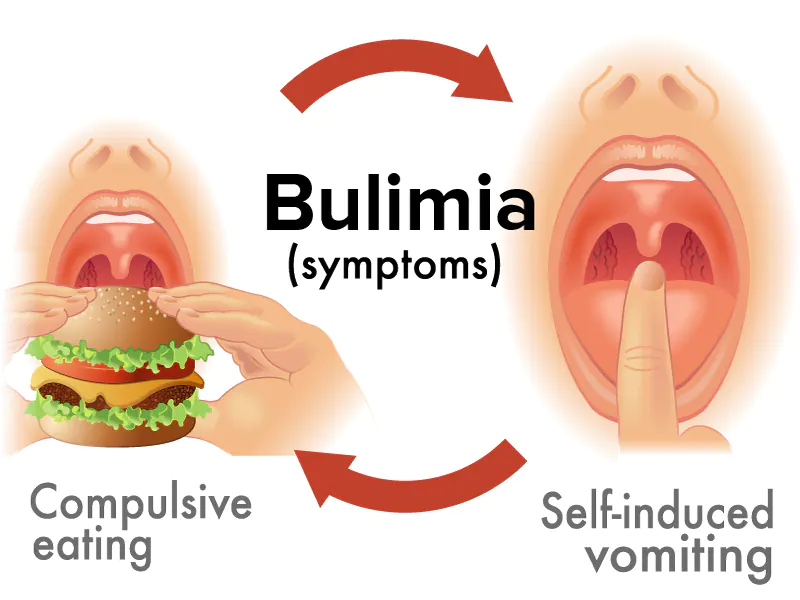Bulimia nervosa is a serious eating disorder in which the sufferer binges and purges their food. Unlike anorexia, where starvation is used to lose weight, bulimia entails consuming a large amount of food, only to expel it soon afterwards by inducing vomiting, using laxatives or exercising excessively. Those who suffer from bulimia are referred to as bulimics, and it most often affects teenage girls and young women.
Considered a mental disorder as well, bulimia makes those who suffer from it feel a loss of control. Stemming from a negative body image, bulimia can wreak havoc on both the body and mind. Bulimics often feel they are “fat,” no matter what the scale says. They may feel depressed or guilty that they can’t stop the disease on their own. And many bulimics display an overachieving behavior and an obsession with weight loss.
A Negative Effect
Although bulimia nervosa is characterized by binging and purging at least twice a week, bulimics often have more frequent episodes. Many force themselves to throw up daily, which is an extremely unhealthy way to lose weight. Stomach bloating, cramping, constipation, dehydration and exhaustion are common side effects from the constant vomiting and lack of nutrition. Bulimics may also notice swelling in the hands, lower legs, feet or salivary glands.
Not only does it do damage to your body, but bulimia nervosa has a devastating effect on teeth! As acid from the stomach enters the mouth, it erodes tooth enamel, resulting in tooth decay and tooth discoloration. It not only looks bad, but bulimics often suffer from toothaches, multiple cavities, dry mouth, oral lesions and bleeding gums. For those who have silver dental fillings, the amalgam will appear “raised” due to the reduction of tooth enamel. And having dental braces won’t help — dental restorations and appliances can also become loose and dislodge from the jaw.
Figuring It Out
Bulimics often try to hide their disease from their loved ones. If you believe a friend or family member may be suffering from bulimia effects, there are several signs to help you determine the problem:
- Frequent vomiting
- Tooth decay
- Tooth discoloration
- Obsession with weight or low self-esteem
- Abnormal eating habits: fasting followed by eating a large amount of food, bizarre food rituals or a poor diet
- Hiding or stealing food
- Repeated tooth brushing or use of mouthwash
- Excessive use of laxatives
- Recurrent stomach ailments
- Tiredness or dizziness
- Over-exercising
Diagnosis and Treatment
For those who suffer from bulimia effects, there is help! If you or someone you know has bulimia, contact a physician for a medical evaluation. Individual therapy and support groups are most helpful in treating the psychological aspects of the disease. Dentists also play a key role in bulimia treatment. Dentists are often able to suspect when a patient is bulimic, due to the specific side effects that repeated vomiting has on teeth.
Once the bulimic has decided to seek help, dental care will become a significant part of their bulimia treatment. As long as the bulimic continues to binge and purge, they will probably suffer from frequent cavities and bleeding gums. Restorative dentistry options may include tooth filling and gum disease treatment, but ongoing bulimia treatment may be needed until the bulimia is cured. In the meantime, fluoride treatments will help reduce sensitivity. A cap or dental crown is often needed to repair extremely damaged teeth, but is usually recommended only after the bulimic can control vomiting.
Take Care of Yourself
There are ways to better care for your teeth at home while you seek help. Be sure not to brush your teeth after vomiting, as most bulimics feel compelled to do. The abrasive materials in toothpaste will further damage tooth enamel made sensitive by stomach acid. Eating or drinking anything acidic will have the same effect. Instead, wash your mouth out with water to neutralize the acid, and wait a few hours before you eat, drink or brush your teeth.
Practicing excellent oral hygiene will also help slow the process of tooth erosion. It’s extremely important to receive ongoing professional dental care. Although you may feel embarrassed by the condition of your teeth, visiting a caring dentist will relieve pain and restore your smile. As untreated bulimia effects can lead to large cavities, expensive dental treatment or even tooth loss, treatment should be sought as early as possible. Getting help early will not only strengthen your dental health, but will increase your chances of recovery and improve your self-esteem!

